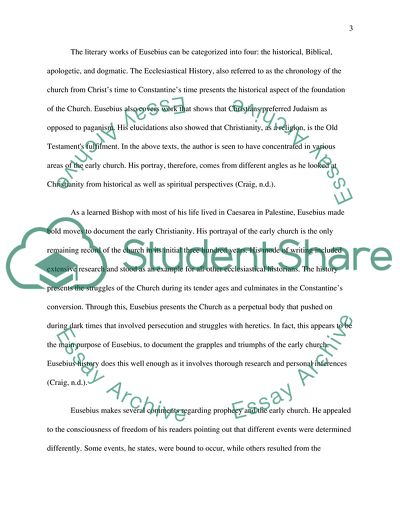Cite this document
(Portrayal of Early Christian Mission in Acts of Apostles and Eusebius History Essay Example | Topics and Well Written Essays - 1250 words, n.d.)
Portrayal of Early Christian Mission in Acts of Apostles and Eusebius History Essay Example | Topics and Well Written Essays - 1250 words. https://studentshare.org/religion-and-theology/1831370-compare-the-portrayal-of-early-christian-mission-in-the-acts-of-the-apostles-and-in-eusebius-history
Portrayal of Early Christian Mission in Acts of Apostles and Eusebius History Essay Example | Topics and Well Written Essays - 1250 words. https://studentshare.org/religion-and-theology/1831370-compare-the-portrayal-of-early-christian-mission-in-the-acts-of-the-apostles-and-in-eusebius-history
(Portrayal of Early Christian Mission in Acts of Apostles and Eusebius History Essay Example | Topics and Well Written Essays - 1250 Words)
Portrayal of Early Christian Mission in Acts of Apostles and Eusebius History Essay Example | Topics and Well Written Essays - 1250 Words. https://studentshare.org/religion-and-theology/1831370-compare-the-portrayal-of-early-christian-mission-in-the-acts-of-the-apostles-and-in-eusebius-history.
Portrayal of Early Christian Mission in Acts of Apostles and Eusebius History Essay Example | Topics and Well Written Essays - 1250 Words. https://studentshare.org/religion-and-theology/1831370-compare-the-portrayal-of-early-christian-mission-in-the-acts-of-the-apostles-and-in-eusebius-history.
“Portrayal of Early Christian Mission in Acts of Apostles and Eusebius History Essay Example | Topics and Well Written Essays - 1250 Words”. https://studentshare.org/religion-and-theology/1831370-compare-the-portrayal-of-early-christian-mission-in-the-acts-of-the-apostles-and-in-eusebius-history.


